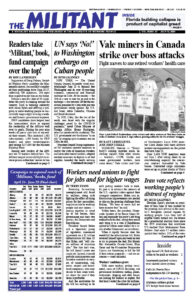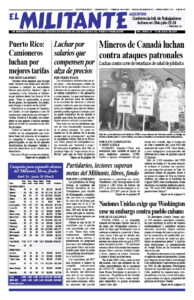NEW YORK — The United Nations General Assembly voted overwhelmingly June 23 to demand that Washington end its over 60-year-long economic, commercial and financial embargo on Cuba. At the session — the 29th in a row to vote for an end to the embargo — the vote was 184 for the resolution presented by Cuba with just two governments voting against, the U.S. and Israel, while Colombia, Ukraine and Brazil abstained.
“In 2020, Cuba, like the rest of the world, was faced with the singular challenges posed by the COVID-19 pandemic,” noted Cuban Minister of Foreign Affairs Bruno Rodríguez, when he introduced the resolution. The U.S. government saw the disease “as an ally” in stepping up its economic war on Cuba, he said.
“President Donald Trump implemented 243 unilateral coercive measures to restrict the visits of American travelers and harm other tourist markets, adopted wartime measures to deprive us of fuel supplies; hounded the health services we provide in many countries” and many other strictures. The embargo has caused $9.1 billion in losses over just a year and a half.
The administration of Joseph Biden has not lifted a single restriction. On May 14 it renewed Cuba’s listing as a country that refuses to “fully cooperate” in fighting terrorism.
The U.S. government began its assault against the Cuban Revolution shortly after Fidel Castro led workers and farmers to power in 1959. The next year Washington blocked sugar imports from Cuba, banned U.S. exports to the island and shut down the U.S.-government-owned nickel processing plant there.
Under Democrat John F. Kennedy, Washington financed, trained and organized mercenaries in the April 1961 Bay of Pigs invasion, a failed attempt to overthrow the revolution by force.
Every U.S. president since — Democrat and Republican alike — has continued to punish working people in Cuba for daring to overthrow the U.S.-backed dictatorship of Fulgencio Batista, replacing it with a government of workers and farmers and opening the first socialist revolution in the Americas.
The U.S. rulers hope to this day that keeping up the pressure — including forcing other governments and foreign corporations to abide by the embargo — will open the door to overturning the revolution. But they underestimate the strength of that revolution and the capacities of working people in Cuba.
“It is remarkable that a small island subjected to a blockade has been able to produce five vaccine candidates,” Rodríguez said, referring to Cuba’s vaccines against COVID-19. Cuban-developed Abdala has a proven efficacy of over 90%, and it’s being made available to other countries. The first shipments have been sent to Venezuela.
Cuba has 57 internationalist volunteer medical brigades in 40 countries to help counter the spread of COVID-19. It also has over 28,000 health care workers already giving medical care in 59 nations.
The Cuban people “have been graciously sharing health care professionals in great numbers with the international community,” Kitty Sweeb, ambassador of Suriname, said during the General Assembly debate.
“My country, Angola and the Angolan people, are eternally grateful for the help provided by Cuba at the time we needed it the most; first in the military field and later in the field of health and education in which Cuba excels,” Ambassador Joao Iambeno Gimolieca said. Between 1975 and 1991 some 425,000 Cuban volunteers, organized by Cuba’s revolutionary leadership, served in Angola. They played a key role in helping Angola defeat repeated invasions by the U.S.-backed armed forces of the white supremacist regime in apartheid South Africa.
The Cuban volunteers helped defend Angola’s independence, enabled working people of Namibia to win theirs and hastened victory led by the African National Congress in overthrowing the apartheid regime in South Africa.
‘An inspiration to humanity’
“Cuba’s solidarity and internationalism is an inspiration to humanity,” said South African Ambassador Mathu Joyini.
In his short speech at the meeting, Rodney Hunter, the Biden administration’s “political coordinator” at the U.S. Mission to the U.N., cynically claimed that “advancing democracy and human rights remain at the core of our policy efforts toward Cuba.”
U.S. government “concerns about human rights are not legitimate,” Pedro Luis Pedroso, Cuba’s U.N. ambassador, replied. “Washington has no moral authority to judge Cuba on human rights.” He pointed to widespread police brutality and racial oppression in the U.S.
After the resolution vote, some 85 opponents of Washington’s economic war on Cuba celebrated outside the Cuban Mission just blocks from the U.N.

